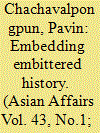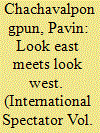| Srl | Item |
| 1 |
ID:
176179


|
|
|
|
|
| Summary/Abstract |
The Thai monarchy, in partnership with the powerful military, has faced an unprecedented challenge from protesters aiming to rein in its unchecked informal authority through specific reforms in adherence with the country's Constitution. For decades, the two institutions had forged a solid partnership, which has stridently dominated the Thai political landscape, leaving a little room for contest from the opposition. But the monarchy under King Maha Vajiralongkorn faces a new crisis of legitimacy, as shown by the manifest evidence of the ten-point demands articulated by the protesters, as well as my independent investigation into the feasibility of open dialogue on the status of the monarchy.
|
|
|
|
|
|
|
|
|
|
|
|
|
|
|
|
| 2 |
ID:
092268


|
|
|
| 3 |
ID:
116626


|
|
|
|
|
| Publication |
2012.
|
| Summary/Abstract |
This article draws on the concept of historical overhang, which essentially refers to the way in which negative historical memories both inform and influence public perceptions as well as those of policy makers. It is the manner in which perceptions drawn from historical episodes are interpreted that makes them enduring. The distortion of history and the misuse of nationalism are mainly responsible for the endurance of historical overhangs in Thai-Cambodian relations, particularly when political leaders encountered legitimacy crises at home. The article investigates two major causes of the recent severe deterioration in Thai-Cambodian bilateral ties- the conflict over the disputed Preah Vihear Temple and the clash between the Thaksin-Hun Sen alliance and the Abhisit Vejjajiva government and makes the contrast with the sudden improvement in relations after Abhisit's electoral defeat.
|
|
|
|
|
|
|
|
|
|
|
|
|
|
|
|
| 4 |
ID:
105696


|
|
|
|
|
| Publication |
2011.
|
| Summary/Abstract |
India has been eager to expand its economic networks with Southeast Asia, one of the most vibrant segments of the world economy, accounting for a large share of global exports. In addition to the economic links required to feed India's fast growing economy, greater cooperation and integration is considered a way of promoting development in India's northeast as well as the less-developed Southeast Asian countries. While some fear growing rivalry in the area between India and China, their growing commercial interests are more likely to lead to enhanced cooperation, given the need to build up a peaceful environment to protect their business interests in the region. The competition could also prove beneficial to Southeast Asia itself, spurring economic openness and competition.
|
|
|
|
|
|
|
|
|
|
|
|
|
|
|
|
| 5 |
ID:
144657


|
|
|
|
|
| Summary/Abstract |
The concept of neo-royalism—being sacred, popular, and democratic—has served
as a formula of success during King Bhumibol Adulyadej’s long reign. However, in
the twilight of the Bhumibol era and with the obviously less able Crown Prince
Vajiralongkorn waiting to succeed, this concept poses a potentially dangerous trap
for the monarchy and its entire network.
|
|
|
|
|
|
|
|
|
|
|
|
|
|
|
|
| 6 |
ID:
135910


|
|
|
|
|
| Summary/Abstract |
Following the coup of 22 May 2014 in Thailand, the military has striven to narrow the democratic space while curtailing many forms of freedom. But even with the worst kind of authoritarianism, political legitimacy remains fundamental for the longevity of the regime. To prolong its political life, the military has embarked on distributing economic benefits to the people in an effort to acquire acceptance and loyalty through various populist programs, a practice made famous by its political nemesis, the Shinawatra political clan. For example, the military has ordered the disbursement of funds owed to poor farmers by the previously deposed government under a rice subsidy program. For the military, its survival depends on popular appeal. To keep the people happy, the military must demonstrate its ability to deliver economic benefits; and this partly hinges on how much the West perceives the suspension of democratic freedoms as a threat. Thailand is vulnerable to sanctions as it is linked to global supply chains of crucial commodities. The disruption of these links would impact the local economy and thus local consumers. Here, international sanctions have the potential to influence the behavior of the Thai junta. The United States and the European Union have warned that they may take more aggressive measures, including boycotting Thai products, if the military fails to restore democracy soon. Harsher sanctions will affect the economic livelihood of Thais and could consequently defy the legitimacy of the military regime.
|
|
|
|
|
|
|
|
|
|
|
|
|
|
|
|